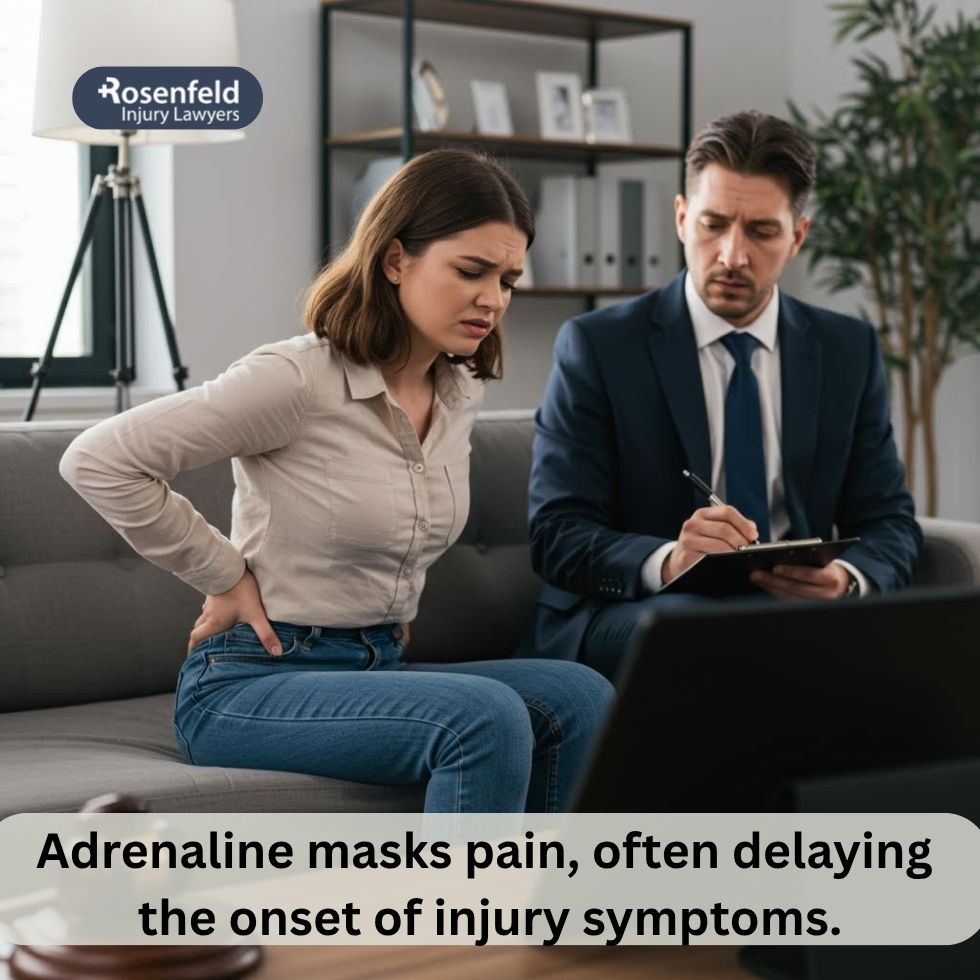- 24/7 Free Consultation: (888) 424-5757 Tap Here To Call Us
Watch Out for Delayed Symptoms After a Car Accident
Experiencing a car accident can be overwhelming, and it’s common to feel relieved if you don’t notice any immediate injuries. Watch out for delayed symptoms after a car accident, including issues like whiplash, concussions, or internal injuries, which may take hours or days to appear.
If you’ve been involved in a car accident, consulting with a car accident lawyer in Chicago can help you navigate the complexities of delayed injury symptoms and protect your right to compensation.
Why Do Delayed Symptoms Happen After a Car Accident?
After a car accident, your body’s natural defense mechanisms, including the fight-or-flight response, release adrenaline and endorphins. These chemicals can temporarily mask pain, leading you to believe you’re uninjured immediately following the incident.
However, as their effects diminish, injury symptoms may emerge hours or even days later. This delay is particularly common with injuries like whiplash, where neck pain and stiffness often develop within 24 to 72 hours after an accident.

Common Symptoms That May Be Delayed After an Auto Accident
According to the Illinois Department of Transportation’s 2021 Annual Report, there were 9,423 serious injuries involving motor vehicles in Illinois. However, after a car accident, it’s common for people to assume they’re fine if they don’t feel immediate pain.
However, injury symptoms may not appear for hours or days after the incident. This delay happens because of the body’s natural response to a traumatic event. Adrenaline and shock can temporarily block pain signals, leading you to overlook unseen physical injuries like internal bleeding.
Headaches and Brain Injury Symptoms
Persistent or worsening headaches are a frequent sign of a more serious underlying issue. These could indicate a concussion, brain injury, or even a blood clot. Other symptoms after a car accident might include sensitivity to light, difficulty concentrating, dizziness, and confusion, all of which can point to delayed-onset symptoms.
In some cases, victims develop traumatic brain injuries that aren’t immediately apparent but lead to long-term neurological symptoms. Excessive sleeping or extreme fatigue can also accompany these injuries, disrupting normal routines and requiring prompt medical evaluation.
Neck and Back Pain That Worsens Over Time
Neck pain and back pain are two of the most commonly delayed symptoms. Neck injuries such as whiplash may not become noticeable until inflammation develops. Muscle strain, spinal cord damage, or herniated discs may all begin with mild discomfort but worsen into severe complications if ignored.
Reduced range of motion or stiffness around the cervical vertebrae may signal deeper trauma. Without early diagnosis, chronic pain can develop, affecting your ability to work or carry out daily activities.
Numbness and Tingling Can Signal Nerve Damage
Numbness or tingling in the arms, hands, legs, or feet can be a sign of nerve damage. These sensations often mean that a spinal cord injury or herniated disc is pressing on nearby nerves. Though these physical symptoms might seem subtle at first, they can result in permanent nerve issues if medical treatment is delayed. Don’t dismiss these signs, especially if they develop or worsen over time.
Abdominal Pain Could Indicate Internal Bleeding
Abdominal pain following a car accident should never be taken lightly. This symptom is one of the most serious, often pointing to internal bleeding or organ damage caused by blunt force trauma.
Delayed pain in this region may also come with other symptoms such as dizziness, large bruises, weakness, or rapid heartbeat. If left untreated, internal injuries can quickly turn into a medical emergency, so seek medical attention immediately.
Back Pain May Point to Spinal Injuries
Persistent lower back pain that emerges after a crash could signal serious spinal injuries. Herniated discs, muscle tears, or fractures along the spinal column are often diagnosed days after the initial trauma.
Some individuals experience intense discomfort or a sharp shooting sensation that makes it difficult to stand, bend, or sleep. In cases involving lasting pain or limited mobility, herniated disc settlements may help victims recover compensation for ongoing treatment and lost income. Delayed injury symptoms like these should be evaluated by a physician as quickly as possible.
Soft Tissue Injuries Aren’t Always Visible
A soft tissue injury doesn’t always show bruising or swelling right away. Damage to ligaments, muscles, or tendons, like the neck, shoulders, or lower back, can cause discomfort that creeps in slowly.
Left untreated, these injuries can lead to reduced mobility and long-term complications. Since they’re not always obvious, they’re often missed unless you know what signs to look for.
Mental Health and Psychological Symptoms
Not all signs of trauma are physical. Many individuals experience psychological symptoms, such as anxiety, mood swings, or intrusive thoughts, in the days and weeks after an accident. These can be signs of post-traumatic stress disorder (PTSD), a serious mental health condition.
Sleep disturbances, nightmares, and heightened stress levels may interfere with daily life and recovery. If you’re experiencing delayed symptoms that affect your emotional well-being, it’s important to talk to a professional.
Blood Clots and Circulatory Risks After a Crash
Delayed symptoms can also include complications like blood clots. A blood clot forming in the legs, known as deep vein thrombosis (DVT), may arise due to inactivity during recovery. Swelling, warmth, and redness in the leg are key indicators.
If the clot travels to the lungs, it may cause a pulmonary embolism, which presents as sharp chest pain and difficulty breathing. This is a life-threatening condition that requires immediate medical attention.
Recognizing the Risk of Delayed Injuries
One of the most dangerous aspects of delayed injuries is that they typically go untreated until they cause severe pain or disability. Since many injury symptoms aren’t visible early on, car accident victims should remain vigilant for any new or worsening symptoms.
Seeking medical attention early, especially when symptoms appear gradually, can prevent complications and support your legal claim.

What to Do If You Notice Delayed Injuries After a Car Wreck
Delayed symptoms after a car accident are more common than many people realize. What might seem like minor discomfort—such as neck pain, fatigue, or stiffness—could actually signal a more serious injury. Since some symptoms after an accident are masked by adrenaline or develop over time, it’s important to take any new or worsening sensations seriously.
Delayed injury symptoms like numbness or tingling, headaches, or limited mobility might be connected to spinal cord injuries, soft tissue injuries, or even cervical vertebrae fractures.
Seek Prompt Medical Care
If you notice pain, dizziness, or changes in mood after a car wreck, seek medical attention immediately. Even hidden injuries like a soft tissue tear or the development of a vascular obstruction can escalate quickly if not treated.
Medical imaging may uncover internal damage that isn’t outwardly visible. Some common injuries require follow-up visits and specialist evaluations.
Document Everything
Keep a record of all symptoms, doctor visits, imaging scans, and prescribed treatments. This documentation will be critical if you decide to pursue legal action for your injuries.
Avoid Rushed Settlements
Don’t accept an early settlement from the insurance company before the full scope of your injuries is known. Delayed symptoms, including signs of post-traumatic stress disorder or neurological changes, can emerge days or weeks after the initial impact.
Protect your rights by consulting with a car accident lawyer who understands the long-term implications of these injuries.

Legal Help for Delayed Injury Symptoms After a Car Accident
If you’re dealing with delayed symptoms after a crash, taking legal action may not be your first thought, but it’s often the key to protecting your financial future.
When new or worsening health issues appear after an auto accident, they can affect your daily routine, ability to work, and long-term well-being. Early settlements rarely account for delayed medical complications, which is why working with a legal team is essential.
Since these conditions may not be immediately apparent, insurance companies may try to downplay them or argue they aren’t connected to the collision. This makes documentation, expert testimony, and a clear medical timeline critical when building your personal injury case.
What a Car Accident Lawyer Can Do
An experienced attorney knows how to prove your delayed symptoms were caused by the crash, not by something else. They’ll gather medical records, accident reports, and doctor testimony that supports your claim. They’ll also look at witness accounts, traffic footage, and vehicle damage to show how the collision caused injuries that took time to emerge.
If your case involves complicated symptoms like neurological changes, soft tissue injury, or traumatic stress, a lawyer may bring in medical experts to strengthen the case. A lawyer will also negotiate with the insurance company to seek a settlement that reflects the full extent of your condition rather than just your immediate injuries.
Why Legal Support Matters After Delayed Injuries

Delayed pain can have a ripple effect, requiring follow-up treatment, disrupting work, and creating financial stress. An experienced Chicago car accident lawyer helps you estimate future costs, including physical therapy, surgery, or ongoing psychological care. If the insurer refuses a fair settlement, your lawyer can prepare for litigation and represent your interests in court.
Ultimately, legal guidance helps protect you from paying out of pocket for long-term effects caused by someone else’s negligence. If you’ve experienced symptoms that weren’t immediately apparent following a car accident, it’s not too late to act. Contact us today for a free consultation and take the first step toward recovery and compensation.
Call (888) 424-5757 or fill out our online form.
All content undergoes thorough legal review by experienced attorneys, including Jonathan Rosenfeld. With 25 years of experience in personal injury law and over 100 years of combined legal expertise within our team, we ensure that every article is legally accurate, compliant, and reflects current legal standards.







